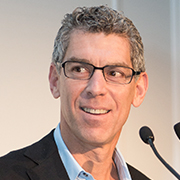
Mitchell Goldhar
One of Canada’s most respected real estate developers, Mitchell Goldhar is a dedicated University of Toronto volunteer, donor and lecturer, and a champion of the University’s strategic city-building initiatives.
Mitchell Goldhar is the founder of SmartCentres, a retail pioneer whose innovative planning concepts led it to become the country’s largest developer of unenclosed shopping centres and changed how Canadians shop. More recently, SmartCentres’ capabilities have grown to include a variety of urban mixed-use residential, office and industrial developments, including a number of master planned communities, such as SmartCentres Place at the Vaughan Metropolitan Centre in Ontario. Goldhar is the executive chairman of SmartCentres REIT and the president and CEO of the Penguin Group of Companies.
Goldhar is an engaged and active philanthropist, supporting medical research and other causes with beneficiaries that include SickKids, Holland Bloorview Kids Rehabilitation Hospital, Princess Margaret Cancer Foundation, the Brain Campaign and the Canadian Museum for Human Rights.
Goldhar’s connections to the University date back to an invitation from Meric Gertler, then the chair of the Department of Geography and now the president of U of T, to help develop and teach a course in real estate development in the Department of Geography in the mid-1990s. The course later transferred to the Rotman School of Management and provides an overview of the real estate industry.
Goldhar has also been generous with his expertise and time as a member of the Boundless Campaign Closing Committee and the Campaign Cabinet at the Rotman School. His advice and support have helped drive important University initiatives, including the Rotman School’s real estate programs and the formation of the recently announced School of Cities.
As a teacher, volunteer and supporter, Goldhar’s many contributions have helped shape the minds of the next generation of Canadian business leaders, strengthened the University of Toronto’s teaching and research capacity in critical new areas, and focused strategies and aspirations for the University as a city-building institution.
